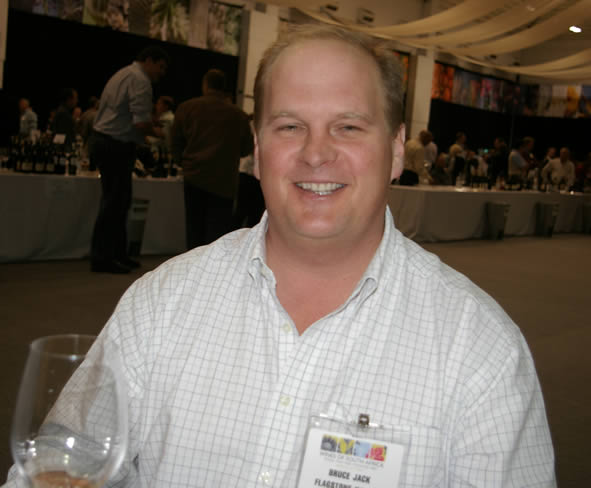|
Bruce
Jack interview: Flagstone
joins Constellation,
Jack to run Kumala

Bruce Jack’s Flagstone operation is one of South
Africa’s most innovative wineries. Initially established in Cape
Town’s trendy Waterfront area, it represented a new way of doing
wine: rather than follow the usual South African ‘Estate’
model, Bruce took the virtual winery approach, without owning any
vineyards. Instead of just buying grapes, though, he rented land,
entering into a close relationship with growers. In 2002, the
winery relocated from the Waterfront to an ex-dynamite factory in
an industrial estate in Somerset West. Inside this historical
building, which dates back to 1901, there’s a crane so that all
operations can be managed by gravity rather than pumping, and the
walls are decorated with coloured lighting tubes spelling out the
words ‘seduce’, ‘succumb’, ‘sense’, ‘swirl’ and
‘serenade’. It’s a creative sort of environment that fits
with Flagstone’s eclectic portfolio.
With its modern, high quality wines and innovative
approach, Flagstone has become one of the most visible and
celebrated wineries in South Africa, and Bruce, with his
articulate, forthright views has become an opinion former in the
trade. It therefore came as a real shock when yesterday it was
announced that Flagstone was in the process of being acquired by
Constellation, the world’s largest wine company. Constellation
have a growing list of wine producers scattered around the world,
including the likes of Mondavi, Hardys, Ravenswood, Kim Crawford,
Nobilo, Da Luca and Kumala.
Eager to find out the story behind this surprising
move, I caught up with Bruce Jack at the South African mega
tasting and asked some questions. He was looking tired, but was
eager to chat. ‘It has been tough to keep this quiet for the
last couple of months’, he says. ‘The worst part was keeping
it from my mates in the industry’. Indeed, he only told the
Flagstone staff about this on Friday. ‘When I broke the news to
my team, everyone cried’.
The first issue I had was the perceived disconnect
between Bruce with his free-spirit approach to wine, and the big
corporate giant of Constellation. Is there a poor fit here?
‘I don’t think there is’, explained Bruce. ‘I
don’t think constellation is typically corporate: it’s family
controlled.’ He cited the example of Sonoma producer Ravenswood,
which was acquired by Constellation in 2001, where the founder
Joel Peterson has been able to maintain his autonomy. ‘Troy
Christensen [current CEO of Constellation Europe] is an amazing
guy, and he has reassured me in the negotiations we have had that
the specialness of Flagstone will be maintained’. Bruce will
remain autonomous as the man at the top: ‘The winemaking-led
philosophy of Flagstone isn’t going to change’, he maintains.
‘The only thing that changes is the source of the revenue’.
So was Bruce forced to sell because of financial
constraints? He denies this. ‘We’re mostly family funded and
there’s been no pressure to sell. It has been a tough internal
debate to convince my family that this was the right thing to
do.’
But there’s more to this story than just Flagstone
being sold. Perhaps a more interesting, and important development
is that Bruce will now be at the helm of Kumala. Launched in 1995
by Western Wines as an export-only brand, Kumala was a great
success story, and still accounts for 23% of South African wine
sold in the UK. In 2004 Constellation bought Western Wines and
with it Kumala, but the brand is now currently in need of
revitalizing.
Bruce is enthusiastic about this new role, and sees it
as a big chance for South African wine in general. ‘I’m
frustrated that to date there hasn’t been a big South African
brand’, he says. ‘Kumala should have been that’. He will
have complete responsibility for Kumala winemaking. ‘I want to
take Kumala back to the vineyards’, he says. Currently, Kumala
is sourced as finished wine, but Bruce reckons that he needs to
unlock the potential at the vineyard stage. ‘I want to identify
growers in the Co-ops we buy from and follow the grapes through to
the product. I understand our soils, and my belief is in our land
and terroir. No one is doing this at the moment for brands in
South Africa.’ Bruce thinks that by working with growers and
giving them a sense of ownership of the brand, the wine will
improve greatly. ‘It’s an opportunity to give the brand
integrity and authentic roots, taking growers along with us.
It’s the old Penfolds model: you unlock value by getting them
involved.’
South African wine could certainly do with a really
good, successful wine brand, and if Bruce can help turn Kumala
around, then this could be great news for the industry. ‘This is
a fantastic opportunity to do this with a brand that has
traction’, he says. ‘We only live once and this is an
opportunity for me to put my money where my mouth is.’
Bruce also reckons that this move will free up his time
to concentrate on what he’s good at: winemaking, rather than
dealing with finance, human resources and other elements of
running a business. ‘I’m geed up about it, and I want to be
given 36 months to prove my point.’ One thing is sure: there
will be a lot of people watching what he does quite carefully.
see
also: report on a visit to Flagstone
Back
to top
|

